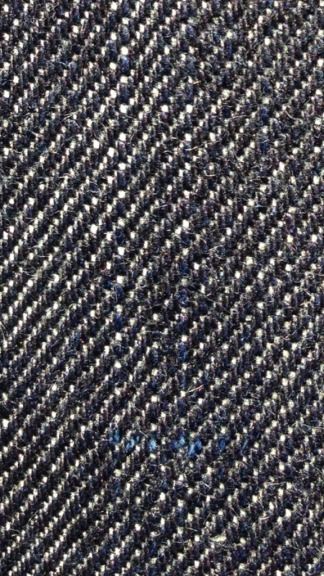Heavyweight Denim Championships 2013-2015 - Official Thread
-
This is what shrinkage is…
Yarns and/or fabrics are not fixed materials. They consist of separate fibres that will stretch when exposed to tension, i.e. they elongate during the process of being made into cloth (during spinning, weaving, bleaching, dyeing and the various finishing processes, yarns and cloth are under continuous tension). Some or all of this stretch within the fabric is retained in the post-loom fabric because of friction between the fibres and the yarns.
The stretch that occurs can be eliminated when the friction within the fabric is reduced. This will happen during soaking and/or washing, where both water and soap act as lubricants. The lubricants, along with the mechanical action of the washer, help the fibres relax and contract (shrink) back to their original length.
One of the reasons that dry cleaning does not shrink natural fabrics is that the friction within the fabric is not reduced by dampening.
-
I posted the link last night, but it appears that no one followed it.
Here is the link again though…
-
Maybe it was the agitation of the dryer, combined with the heat

Look, whatever works for you man, but when I say that it is saturation which mainly effects shrinkage it is not my opinion, it is simply how it happens. If you don't believe me then try putting a pair of dry jeans in your dryer and see what happens…....you get hot jeans

Sanforation does not involve water though.. Unless I'm wrong
And I'm not arguing with you , I just enjoy discussing it
-
I think I remember Giles saying that also the speed of the drying after the jeans were in the water plays a major role. And to dry your pair in the dryer is the fastet way, I'm sure, and thus you will get more/most shrinkage when you use it
-
Sanforisation, what is it?
Sanforization is a post weave process, patented by Sanford Lockwood Cluett in 1930. It is a method of shrinking and fixing the woven cloth in both length and width before it is made into garments and other items.
The fabric to be sanforized is moistened by water and/or steam, this lubricates the fibres and reduces the inherent friction within the fabric. Once moist, the fabric enters the sanforization process proper. Here, an endless rubber belt is squeezed between a pressure roll and a rubber belt cylinder, it is here that the stretching of the elastic belt surface occurs. The more the rubber belt is squeezed, the more the surface is stretched. This point of squeezing is known as the pressure zone, or the nip point. The fabric is fed into the pressure zone and upon leaving it, the rubber belt recovers itself and the surface returns to its pre-squeezed (stretched) size carrying the fabric with it. The effect of this action is a shortening of the warp yarns, which packs the filling yarns (weft), closer together: at this moment, shrinkage occurs.
After compaction, the fabric enters a dryer where the fibres are locked in their shrunken state as the moisture is removed from the fabric.
http://www.ironheart.co.uk/forum/index.php?topic=4550.msg242080#msg242080
-
according to urbandictionary.com:
shrinkage- what happens to a man's penis in cold water. Often a result of cold showers, swimming pools, or the ocean. Very embarrassing.
"Man, that pool could make a porn star look like a 9 year old."
you can go with either gles definition or urbandictionary. your choice
-
Bahahahaha

-
Nerkg - I didn't take it as an argument, I was simply pointing out that you were wrong

-
BF. I did, but I was wrong. It is all about reducing the friction in the fibres so getting it wet and using a lubricant (detergent) will reduce the friction most and therefore unlock the inbuilt tension.
Thx Giles! So I have to update my brain now

-
Nerkg - I didn't take it as an argument, I was simply pointing out that you were wrong

Where does sanforization come in to that
-
Right, now you've lost me totally. I was talking about how saturation and agitation are required to achieve maximum shrinkage, I never mentioned Saforisation, you did. And as Giles pointed out, it does indeed also involve water and movement - the key elements of shrinkage.
-
Sanforisation, what is it?
Sanforization is a post weave process, patented by Sanford Lockwood Cluett in 1930. It is a method of shrinking and fixing the woven cloth in both length and width before it is made into garments and other items.
The fabric to be sanforized is moistened by water and/or steam, this lubricates the fibres and reduces the inherent friction within the fabric. Once moist, the fabric enters the sanforization process proper. Here, an endless rubber belt is squeezed between a pressure roll and a rubber belt cylinder, it is here that the stretching of the elastic belt surface occurs. The more the rubber belt is squeezed, the more the surface is stretched. This point of squeezing is known as the pressure zone, or the nip point. The fabric is fed into the pressure zone and upon leaving it, the rubber belt recovers itself and the surface returns to its pre-squeezed (stretched) size carrying the fabric with it. The effect of this action is a shortening of the warp yarns, which packs the filling yarns (weft), closer together: at this moment, shrinkage occurs.
After compaction, the fabric enters a dryer where the fibres are locked in their shrunken state as the moisture is removed from the fabric.
http://www.ironheart.co.uk/forum/index.php?topic=4550.msg242080#msg242080

-
Boys, boys, to each their own is what I say
Exactly, if it works for you just go with it.
-
Me best Popeye impression. I don't have a corn cob, tho.

-


